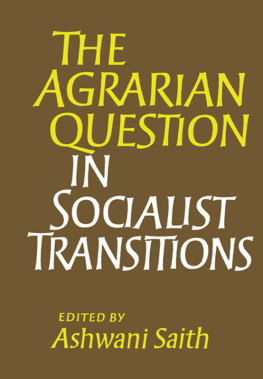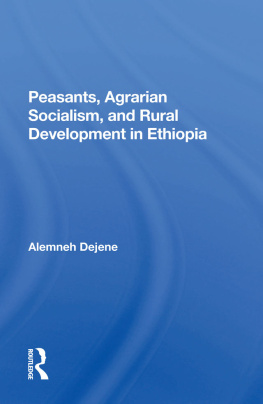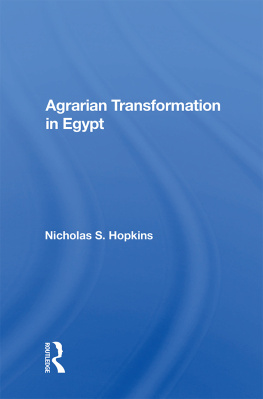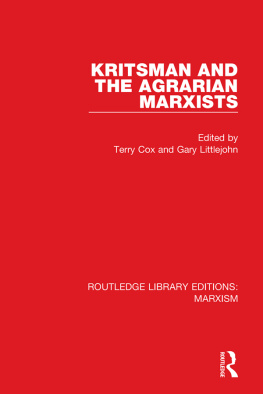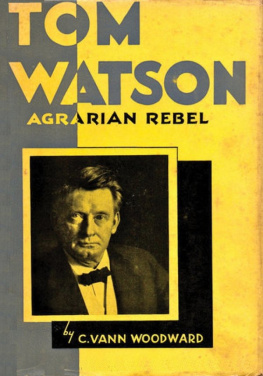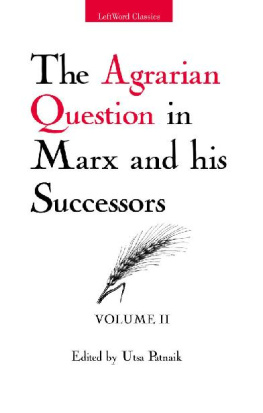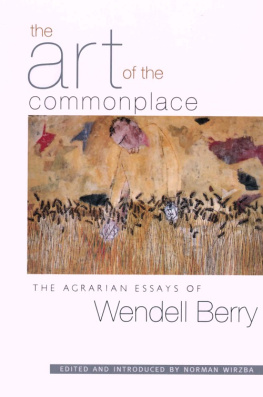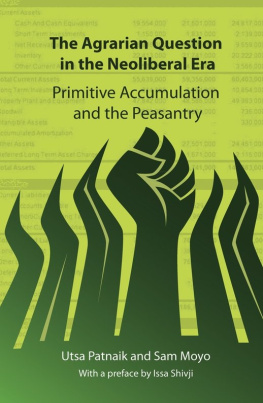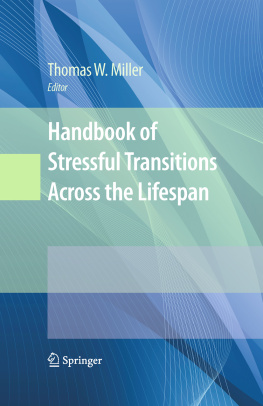First published in Great Britain by
Routledge
2 Park Square, Milton Park, Abingdon, Oxon, OX14 4RN
270 Madison Ave, New York NY 10016
Transferred to Digital Printing 2007
Copyright 1985 Routledge
British Library Cataloguing in Publication Data
Special issue on The Agrarian question in socialist transitions.
1. AgricultureEconomic aspectsCommunist countries
I. Saith, Ashwani II. Journal of development studies
338.1091717HD1415
ISBN 0-7146-3276-7
This group of studies first appeared in a Special Issue on 'The Agrarian Question in Socialist Transitions' of The Journal of Development Studies, Vol. , No. 1, published by Routledge
All rights reserved. No part of this publication may be reproduced, stored in a retrieval system, or transmitted in any form, or by any means, electronic, mechanical, photocopying, recording, or otherwise, without the prior permission of Routledge
Cover design by Michael Harvey
Publisher's Note
The publisher has gone to great lengths to ensure the quality
of this reprint but points out that some imperfections
in the original may be apparent
Primitive Accumulation, Agrarian Reform and Socialist Transitions: An Argument
by Ashwani Saith *
This essay constructs a preliminary argument concerning the position of the peasantry in the twin transitions: the first to industrialisation, and the second, towards socialism. In the poor developing country launching upon both simultaneously, the agrarian question bifurcates into two dichotomous sets of issues. The first concerns the instrumentality of the agricultural sector in assisting industrialisation through the provision of investible resources which the nascent industrial sector cannot generate from within or elsewhere. The second set treats the rural sector not as the continued object of exploitation in the form of primitive socialist accumulation, but rather as the subject of socialist development. The two are obviously interdependent, but in the context of a range of widely observable socialist industrialisation strategies, also frequently incompatible. It is argued that according primacy to accelerated industrial growth generates inter-sectoral imbalances which are resolved through the adoption of expeditiously selective commoditisation and institutional policies, especially in the rural sector, which inexorably divert the trajectory of societal transition away from any socialist direction. The general argument would obviously not apply uniformly to varying concrete specifications, although a fair illustration of it is provided by Ethiopia since 1974.
I. INTRODUCTION
The Agrarian Question in Socialist Transitions
This essay constructs a preliminary argument concerning the position of the peasantry in the twin transitions: the first, to industrialisation, and the second, towards socialism. Within orthodox Marxian theory, the two transitions are also sequential; with the socialist order emerging from the crisis, breakdown and overthrow of the capitalist system which in its maturity becomes a fetter upon further development, and begets with the inexorability of a law of Nature, its own negation [ Marx, 1969: 144 ]. At this juncture, the process of proletarianisation has been completed in the economy as a whole, including the agricultural sector, where the petty peasant producers and artisans have been separated from their means of production and have been reduced to the status of sellers of labour power, while the landlords and/or sections of the middle and rich peasantry have emerged as capitalist farmers who treat agriculture as a branch of industry integrated fully with the rest of the economy. However, this bit of Marxs theory of history was drafted without the benefit of hindsight and, thus far, history has resisted conforming to what was expected of it. The first socialist revolution broke the capitalist chain not at the strongest but rather at the weakest link; and subsequent socialist transitions have also been initiated through revolutionary movements in arenas which display low initial levels of economic, especially industrial, development. At the time of the revolutionary break with the past, none of the present roll of socialist economies boasted an advanced industrial sector; in none of them was the process of rural proletarianisation anywhere near completion. Indeed, in most cases, on both counts, the situation was as far from the Marxian postulation as could be imagined. As such, these countries have entered the socialist transition not through the crossroads of industrialisation; instead, they have launched upon the twin transitions simultaneously.
On his prognosis, Marx assumes the process of primitive capitalist accumulation to have been long since accomplished, and visualises the subsequent socialist appropriation of capitalist property to constitute a relatively painless process:
The transformation of scattered private property, arising from individual labour, into capitalist private property is, naturally, a process, incomparably more protracted, violent, and difficult than the transformation of capitalist private property, already practically resting on socialised production, into socialised property. In the former case, we had the expropriation of the mass of the people by a few usurpers; in the latter, we have the expropriation of a few usurpers by the mass of the people.
[ Marx, 1969: 145 ]
In reality it was the socialist state which had to undertake this protracted, violent and difficult transformation of pre-capitalist property into socialist forms since prior capitalist development, such as it was, had dealt with it only very partially. It would therefore not be wrong to say that these economies have launched upon three transitions, the additional one being that to advanced, socialised agriculture directly from essentially embryonic or precapitalist forms of organisation. Indeed, this transition could be rightly regarded as being the crucial one since it would form the foundation for the other transitions: without advanced industry, socialism could not raise labour productivity and incomes. As Preobrazhensky noted, when productivity is falling or standing still, the equalization principle is poor consolation [ 1980: 23 ]. And without agricultural development, it would be impossible to conceive of rapid industrial transformation. Thus, where the new socialist countries stand, the perspective on future socialist development is dominated by the agrarian performance.
In the context of the socialist transition in a poor developing economy, the agrarian question bifurcates into two dichotomous sets of issues. The first concerns the instrumentality of the agricultural sector in assisting industrialisation through the provision of investible resources which the nascent industrial sector cannot generate in sufficient magnitude from within, or from other sources (for example, colonies). The second set treats the rural sector not as the continued object of exploitation in the form of primitive socialist accumulation but rather as the subject of socialist development by virtue of the fact that it is in the rural sector that the bulk of the population, especially its poorer and oppressed component, resides. One pressing aspect of this socialist development is raising the standard of living of the rural labouring classes; the other perhaps more dynamic dimension pertains to the formulation of an appropriate strategy for effecting an institutional transformation in favour of socialist production relations and organisational forms in the rural sector. The two sets of fundamental issues are obviously not independent. Unfortunately, in the context of a range of observable socialist industrialisation strategies, the two also appear to be incompatible. Such incompatability could arise from the socialist planners viewing the inter-sectoral resource exchanges as a zero-sum game, where additional consumption by the rural population of its own produce is equated with reduced availability of investible surpluses for the industrial sector. It could also derive from the possibility that the pattern(s) of agrarian production relations, that is, the strategy of post-revolution agrarian reform, which expedites the exaction of a development tribute from the rural sector in the early industrialisation phase might not be that which is optimal or desirable from the point of view of ushering in socialist production relations in the countryside. The greater the magnitude and inflexibility of the demands placed by industrialisation upon the rural sector relative to the latters capacity for surplus generation, the sharper would be the edge on this potential conflict between accelerated socialist industrialisation and socialist rural development.


